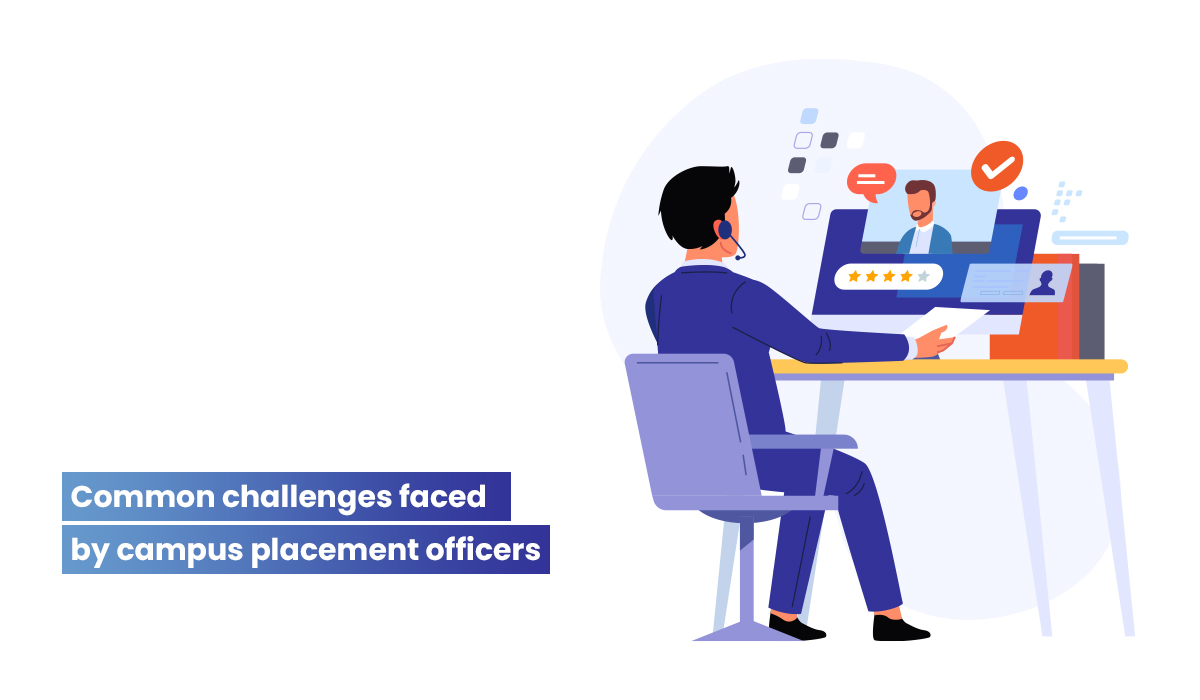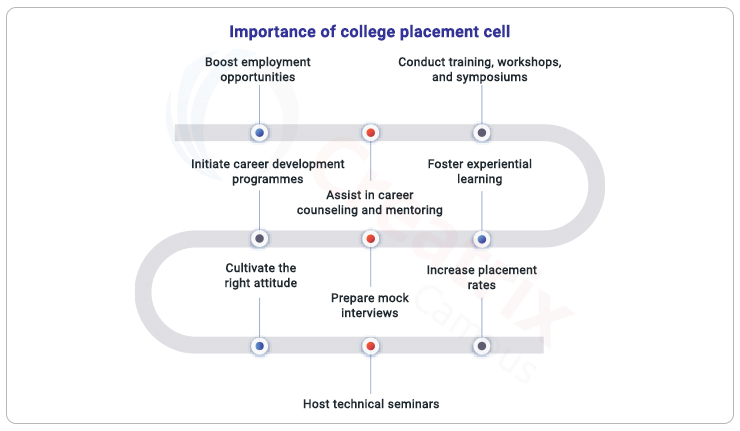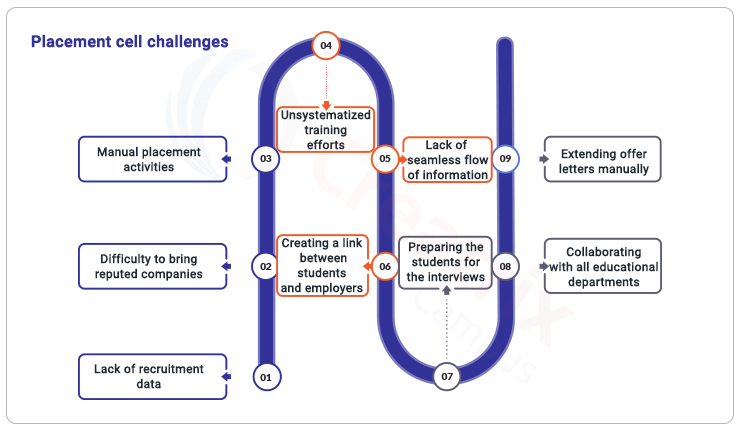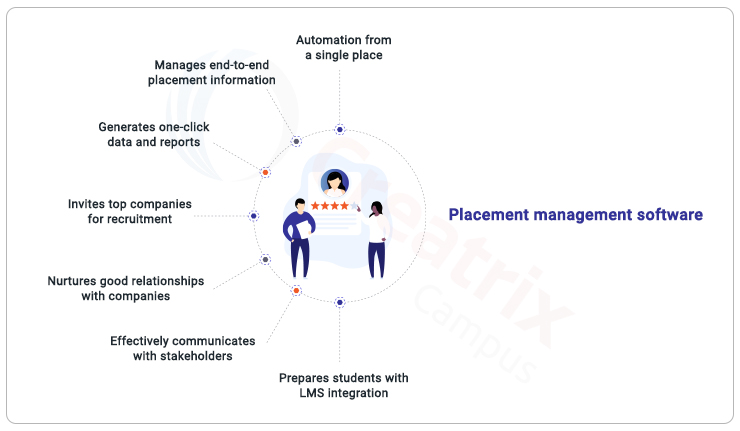How to overcome the challenges of campus placement teams?

If you are part of a campus placement team in your college or a training institute, you should be able to respond to one of the following questions that a student poses:
- What is the placement success rate of your college?
- Which major corporate companies visit your college to hire students?
- How many students were placed in the previous year?
- Do you offer placement assurance?
As a placement officer, you should be able to address these inquiries fairly with proper data in hand. It is your crucial responsibility to serve as a connecting body that prepares the students for the workforce. To the already confused students who are worried about their final exam preparation, a mountain of assignments, and elementary tasks, you must offer necessary programs for skill development training to acquaint them with the sector and the workplace. Revamping your training programs and placement strategies becomes essential. A higher education placement software can help boost your productivity and relieve your mundane tasks.
What is placement in college?
Colleges must adequately prepare the students to ace the campus placements. Their primary responsibility is to secure the best opportunities for the recruitment drive.
Campus recruiting is a drive initiated by a college or university to organize job offers for their students in their final years. During this program, the educational institutions, along with the help of the placement cell, collaborate with employers that want to hire fresh minds.
Why is a college placement cell important in a college?

Every college or a university has to have a solid placement team to boost the placement rate. Some of their main objectives are:
- to ensure that all students have access to promising and suitable employment opportunities
- to assist them with career counseling and mentoring
- to organize a variety of short-term training, workshops, and symposiums on current industry trends.
- to promote experiential learning by organizing internships and industry visits regularly
- conducts several mock interviews to familiarise aspirants with the formal professional code of conduct and to prepare them for the big day
- to identify students' abilities and untapped talents
- to assist students with career development programs in order to help them meet industry expectations
- coordinating departmental visits to industrial facilities
- to host technical seminars featuring business leaders
- to help students become more independent, cultivate the right attitude, and improve their communication skills
What are the challenges faced by college placement cells?
The figure for campus placement rates can really go up if their current challenges are solved. Let’s discuss some of the most pressing challenges that campus placement bodies are currently facing.

Handling placement activities manually
This is a major reason for most of the challenges that the placement officers face. When It's no secret that the traditional (manual) hiring process is extremely slow, inefficient, and complicated. Placement officers face significant challenges in reaching out to and engaging all candidates present in the recruitment drive.
Unable to bring reputable companies for talent hunting
The first biggest challenge that the placement cells face is contacting high-level companies and inviting them to hire the talent from their colleges. The usual scenario out there is, that the tech giants prefer to recruit talents only from Tier 1 colleges than from the Tier 2 and 3 categories.
But since most students graduate from these colleges, it makes life more challenging for placement officers. Nurturing an employer to hire to their institution and achieve their goal becomes a nightmare with outdated, manual processes that most tech companies despise.
Lack of recruitment data
Placement officers who generally lack recruitment data and metrics fail to improve their hiring process and make better decisions. However, gathering and processing data can be time-consuming.
Spreadsheets are one method for tracking hiring data, but they require manual labor, are vulnerable to human error, and are not compliant. This makes it difficult to accurately track data and trends. Therefore the placement officers often require methods for compiling and organizing data in an efficient and streamlined manner.
Unsystematized training efforts
Campus placement is often stressful for students because it is seen as the beginning of their transition from being a student to working professionals. However hard you may plan, placement officers fail here. Incorporating training for skill assessment tests, group discussions, panel interview round, technical tests, general HR round, and much more is indeed challenging.
Lack of seamless flow of information
The placement cells' work does not stop with inviting companies to direct their recruitment processes to their campus. They must also ensure a continuous flow of necessary information to the students. Students frequently fail to prepare for interviews and group discussions due to a lack of information and updates from placement cells.
They even fail to show up for interviews because they cannot find suitable dates. In such cases, the placement cells must pull up their socks and channel all of their activities to ensure a smooth flow of information about the hiring processes and to assist students in acing their interviews in order to land high-paying jobs on campus. They should also ensure that students submit all required documents on time and arrive at the venues on time.
Creating a link between students and employers
Campus placement cells must make all hiring information available to students and provide them with channels to obtain additional information about the recruitment process.
They should be aware of the companies that will be visiting the campus in search of talent, as well as their hiring procedures, previous year's interview questionnaire, likely pay scale, and other pertinent information to better prepare students. Such information may assist the students to determine which companies to apply to and how. This is a significant challenge for institutions that do not have an automated, online campus hiring system in place.
Preparing the students for the interviews
Because the majority of students have no prior experience attending interviews and confidently cracking them, the placement cells face significant challenges in preparing them.
The placement cells should take on them to increase the employability chances of the students, from training them to create eye-catching resumes to presenting themselves properly before the hiring team. However, in the absence of an online system, it is difficult for placement cells to communicate with students on a regular basis in order to understand their needs and assist them.
Collaborating with all educational departments
Job interviews are vastly different from the annual exams that students take. They should be given specialized training on each subject so that they can anticipate the questions that the interviewer may ask them.
As a result, it is the placement cell's responsibility to communicate with each department and provide them with important hiring information from companies that will be visiting the campus. They should also go above and beyond to align education with the recruitment drive and ask all faculty, HODs, logistics teams, and examination bodies to make recruitment their primary mission. Due to the lack of these placement cells, such enhanced coordination is a challenge.
Extending offer letters to a huge number of candidates
It is no secret that thousands of candidates are expected to be screened during a campus or university recruitment drive. Those in the placement cell are humans, too, and screening candidates in a single day is exhausting. However, most institutions continue to use the traditional recruiting method, which results in the screening of thousands of candidates in a day or two. This is a significant task for placement officers who have to ensure that accurate screening happens. Some of the other challenges the placement teams face are,
- Relying on the same list of campuses
- Use repetitive presentations to deliver a pre-placement talk
- Reserve a physical location and time slots
- Send a dedicated recruiting and invigilation team
- Manually assessment evaluations
- Face-to-face interviews will be conducted on each campus
- Logistical costs and execution, with only a few colleges available
- Processes that are lengthy and unstructured
The need for placement management software

The above challenges have forced higher education institutions to look for vendors with high-end placement management software. Such a system,
- Automates all placement activities from a single place
- Manages all student placement information of your college in a centralized location
- Generates one-click data and reports of all kinds
- Invites top companies for a recruitment drive to your college
- Nurtures good relationships with them
- Effectively communicates with all stakeholders
- Prepares students with LMS integration in accordance with current market demands
The best software for managing student placements, Creatrix Campus has an intuitive interface that is simple to use, supports personalized placements, trustworthy data management, and compliance, and gives you the scalability you need across your institution. With Creatrix Campus placement management software, your placement program will advance and thrive.
Contact Creatrix team now.


